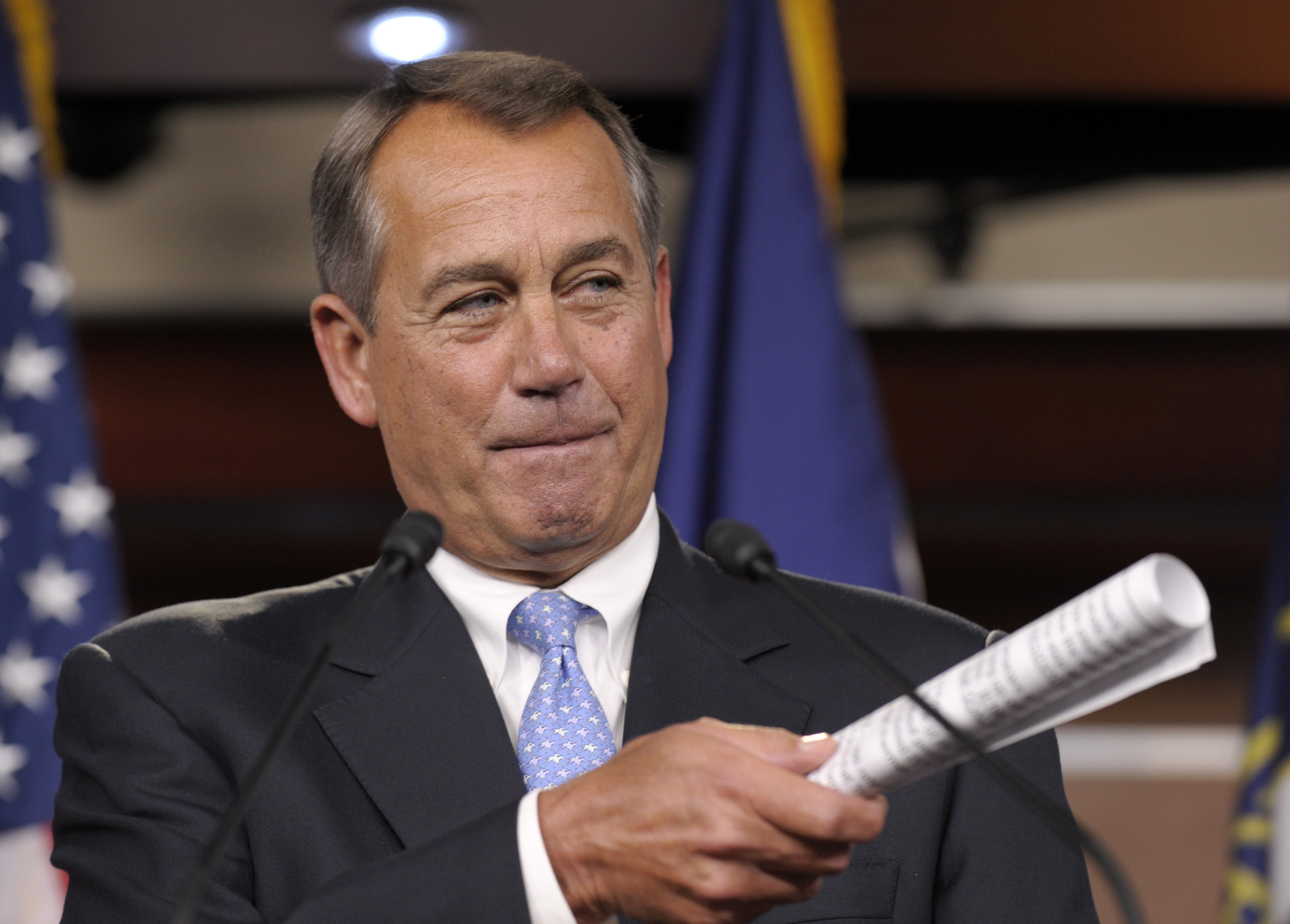Given the rapidly vanishing time needed to put a "fiscal cliff" solution in place to avoid automatic spending cuts and tax increases by Jan. 1, House Republicans are apparently looking for a two-step out. Speaker John Boehner and his minions are reportedly considering swallowing a renewal of Bush-era tax cuts only for the middle class, as President Obama insists, and waiting for the next debt-ceiling-increase debate early in the new year to leverage new tax cuts for the wealthiest 2 percent -- and deep cuts in Social Security, Medicare and other vital programs for everyone else.
The apparent premise of this strategy is that they can again hold the country captive to a default on national debt to extort new tax breaks for their largest campaign donors, never mind all the resulting financial turmoil, recessionary pressure and increased costs of interest on the nation's debt that would fuel. If they believe that would be a politically winning strategy for them, they are over-looking large gaps in their tunnel-vision extortionist tactics.
One fault-line is their limited view of the debt ceiling. It is raised only to pay for prior spending that Congress has already permitted. Threatening to default on that debt would be a self-inflicted wound.
In any case, the bulk of the national debt arises from the fiscal misfeasance of prior Republican-controlled congresses and presidents. The biggest portion of the current national debt of $14.7 trillion was accumulated by George W. Bush and his Republican predecessors, Ronald Reagan and George Herbert Walker Bush, and their toady GOP majorities in Congress.
Though he inherited massive debt, Bill Clinton was able work budget deficits and national debt levels down. He achieved three surplus budgets by the end of his tenure. George W. Bush, who came into office with the debt at roughly $5.7 trillion, enjoyed two Clinton-driven budget surpluses, but quickly returned to deep deficit spending for two unfunded wars and deep tax cuts that mainly favored the nation's ultra-wealthy. He left office with the debt build-up at over $12 trillion, and with several trillion more in the pipeline for President Obama for the continuing Bush wars and tax cuts.
The deep recession that Bush incurred has haunted the national economy since he left. Before the Great Recession that started on Bush's watch, federal tax revenue hovered around 18.5 percent of the nation's gross domestic product, the traditional average.
Following the 2007-2009 financial crash, tax receipts fell to 15.5 percent of GDP, leaving a yawning deficit gap to Obama, along with the hardest economy since the Great Depression.
As the concurrent crashes and financial austerity programs in Europe the past four years have shown, the U.S. economy would be far weaker, and far deeper in debt, had Obama resorted to austerity budgets rather than mild stimulus to bolster the economy and stabilize state governments. Creation by Republicans of another debt-ceiling debacle would surely make the economy worse. Economic estimates put the 10-year cost of the GOP's last debt-ceiling controversy at $18.9 billion: Why shoot the nation's economy in the foot again, all to give back tax cuts mainly targeted at the ultra-rich top tenth of one percent?
That raises the political fallout Republicans would invite by another needless debt-ceiling debacle. Polls on the stalemated Congress show that voters blame Republicans more than Obama for the stalemate by a 2-to-1 margin. A huge majority, as well, favor rollbacks of the Bush tax cuts for the super-wealthy not because they think that would balance the budget, but because the top-end cuts were so lopsided and disproportionately large.
Voters also are strongly averse to cuts in earned entitlements because Social Security and Medicare are crucial for most wage earners, especially in a global marketplace that is inexorably pushing down wages and benefits for all but the top 10 percent of households. Obama has already agreed to spending cuts of roughly $612 billion in non-defense spending as his ante for deficit reduction, and Republicans have yet to respond with a counter in specific cuts.
If Republicans keep on demonstrating that they care more for tax cuts for the ultra-rich than anything else, and that they will gladly trash earned entitlements to pay for those high-end tax cuts, they invite a fight that Obama should proudly engage out of fairness to ordinary Americans.

